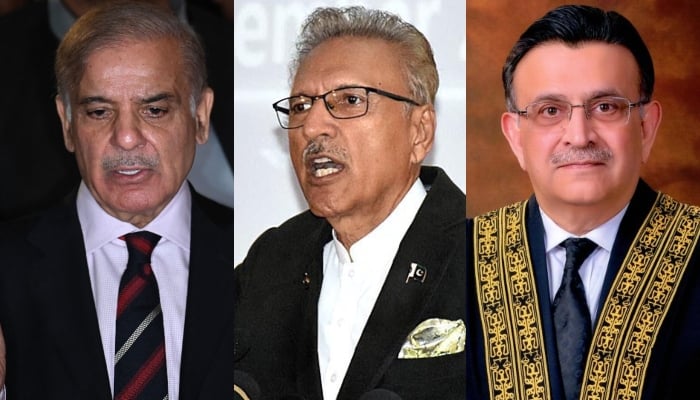- President says Saeed in multiple FIRs related to Masjid-e-Nabavi incident.
- He says FIR registered despite Saeed being present in Pakistan.
- “Whole state machinery is failing in its duty,” the president laments.
ISLAMABAD: In two separate letters sent to Prime Minister Shehbaz Sharif and Chief Justice Umar Ata Bandial on Saturday, President Dr Arif Alvi asked them to resolve the issues raised by former federal minister Murad Saeed and address his grievances regarding the Masjid-e-Nabavi incident.
In his letters, the president referred to the serious allegations levelled by the Pakistan Tehreek-e-Insaf (PTI) leader, which included a “fake, bogus, frivolous FIR was registered against him for the incident that occurred at Masjid-e-Nabvi, on May 1, despite the fact that he was in Pakistan”.
The statement issued in this regard by the President’s Office mentioned that multiple FIRs have been registered against Saeed on the same charges all over Pakistan.
“The aforementioned actions are against the fundamental rights enshrined under Articles 9, 13, and 14 of the Constitution of Pakistan,” the statement mentioned.
President Alvi was quoted as saying that Saeed raised the issue of the deteriorating law and order situation in Malakand (Swat). “Subsequently, he was threatened with dire consequences and was compelled by the law enforcement agencies to leave Swat, along with his family.”
The president pointed out that Article 15 of the Constitution of Pakistan provides that “every citizen shall have the right to remain in, and, subject to any reasonable restriction imposed by law in the public interest, enter and move freely throughout Pakistan and to reside and settle in any part thereof”.
The letters also noted that Saeed raised the issue that on August 18, unknown armed persons, violated the privacy of his home, however, despite his repeated requests and the court’s order, FIR has not yet been registered by Islamabad Police.
Moreover, unknown persons frequently follow and harass him with serious life threats. “It appears as if the whole state machinery is failing in its duty and performance of functions and the president pointed out that such alleged acts are in violation of Article 9 of the Constitution and the law,” the statement mentioned.
The Masjid-e-Nabawi incident
In April, during the premier’s visit to Saudi Arabia, a group of protesters, allegedly belonging to the PTI, loudly chanted slogans against the PM and his delegation as soon as they entered the mosque to pay their respects at the Roza-e-Rasool (PBUH).
Upon the arrival of PM Shehbaz and his delegation at the mosque, the protesters started chanting slogans of “chor, chor (thieves)” when they saw the premier and harassed and raised objectionable slogans against Information Minister Marriyum Aurangzeb.
The protesters also misbehaved with the JWP chief and Federal Minister for Narcotics Control Shahzain Bugti and pulled his hair. The protesters continued to film the entire episode on their mobile phones.
Following the incident, several FIRs were registered against PTI leaders — including the party’s chief, Imran Khan.
Later, a court in Madinah sentenced three Pakistanis — Khawaja Luqman, Muhammad Afzal, and Ghulam Muhammad — to eight years in prison. Meanwhile, another three Pakistani citizens — Anas, Arshad, and Muhammad Saleem — were sentenced to six years in jail for creating chaos and violating the sanctity of the holy mosque.
In October, the Prime Minister and Crown Prince of Saudi Arabia Muhammad bin Salman (MBS) ordered releasing all Pakistani citizens, who had been imprisoned in the kingdom for rioting at Masjid-e-Nabawi (PBUH).


 Latest News3 days ago
Latest News3 days ago
 Latest News3 days ago
Latest News3 days ago
 Entertainment3 days ago
Entertainment3 days ago
 Latest News3 days ago
Latest News3 days ago
 Latest News3 days ago
Latest News3 days ago
 Latest News3 days ago
Latest News3 days ago
 Latest News3 days ago
Latest News3 days ago
 Latest News3 days ago
Latest News3 days ago























